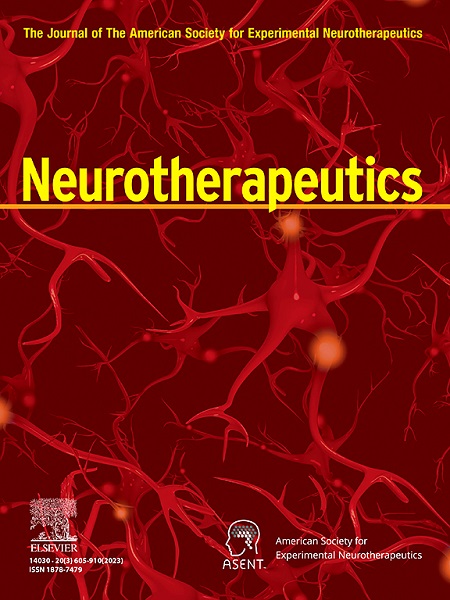吲哚-3-丙酸通过激活PI3K/AKT通路促进周围神经损伤后雪旺细胞增殖。
IF 6.9
2区 医学
Q1 CLINICAL NEUROLOGY
引用次数: 0
摘要
周围神经损伤后,雪旺细胞(SCs)的增殖是轴突再生的重要组成部分,增强其增殖可促进轴突再生。吲哚-3-丙酸(IPA)是肠道菌群合成色氨酸的代谢物,具有促进周围神经轴突再生的潜力。尽管如此,IPA促进SC增殖的能力仍不确定。因此,本研究旨在探讨IPA对SC增殖的影响及其机制。因此,我们在体外培养RSC96细胞,并使用细胞计数试剂盒-8 (CCK8)、EdU细胞增殖检测试剂盒(EdU)和细胞周期和凋亡检测试剂盒进行分析。建立大鼠坐骨神经挤压损伤模型,进行免疫荧光染色。这些结果表明IPA促进SC的增殖。我们进一步通过Western blotting研究了IPA促进SC增殖的潜在机制,发现IPA增加了RSC96细胞中磷酸化磷脂酰肌醇3-激酶/磷脂酰肌醇3-激酶(p-PI3K/PI3K)和磷酸化蛋白激酶B/蛋白激酶B (p-AKT/AKT)的水平,提示IPA可能通过激活PI3K/AKT通路促进RSC96细胞的增殖。我们在体外培养RSC96细胞,在体内建立坐骨神经挤压模型,并给予PI3K抑制剂(LY294002)联合IPA治疗来验证这一假设。EdU、CCK8和免疫荧光染色结果显示,抑制p-PI3K/PI3K和p-AKT/AKT表达后,RSC96细胞或SCs的增殖率降低。这些发现表明,IPA可能确实通过激活PI3K/AKT通路促进SC增殖。本文章由计算机程序翻译,如有差异,请以英文原文为准。
Indole-3-propionic acid promotes Schwann cell proliferation following peripheral nerve injury by activating the PI3K/AKT pathway
The proliferation of Schwann cells (SCs) is integral for axonal regeneration following peripheral nerve injury, and enhancing their proliferation can accelerate axonal regeneration. Indole-3-propionic acid (IPA), a metabolite of tryptophan synthesized by the intestinal microbiota, has potential in accelerating axonal regeneration in peripheral nerves. Nonetheless, the capacity of IPA to promote SC proliferation remains undetermined. Consequently, this study aimed to investigate the effects of IPA on SC proliferation and the underlying mechanisms. Therefore, we cultured RSC96 cells in vitro and used a Cell Counting Kit-8 (CCK8), an EdU Cell Proliferation Detection Kit (EdU), and a Cell Cycle and Apoptosis Assay Kit for the analyses. Additionally, we established a rat sciatic nerve crush injury model in vivo and performed immunofluorescence staining. These findings indicated that IPA enhanced SC proliferation. We further investigated the potential mechanism by which IPA promotes SC proliferation by conducting Western blotting and observed that IPA increased the levels of phosphorylated phosphatidylinositol 3-kinase/phosphatidylinositol 3-kinase (p-PI3K/PI3K) and phosphorylated protein kinase B/protein kinase B (p-AKT/AKT) in RSC96 cells, which suggested that IPA may promote the proliferation of RSC96 cells by activating the PI3K/AKT pathway. We cultured RSC96 cells in vitro, established a sciatic nerve crush model in vivo, and administered a PI3K inhibitor (LY294002) in combination with IPA treatment to validate this hypothesis. Our results revealed a reduction in the proliferation rate of RSC96 cells or SCs following the inhibition of p-PI3K/PI3K and p-AKT/AKT expression, as evidenced by the results of the EdU, CCK8 and immunofluorescence staining assays. These findings indicated that IPA may indeed promote SC proliferation through the activation of the PI3K/AKT pathway.
求助全文
通过发布文献求助,成功后即可免费获取论文全文。
去求助
来源期刊

Neurotherapeutics
医学-神经科学
CiteScore
11.00
自引率
3.50%
发文量
154
审稿时长
6-12 weeks
期刊介绍:
Neurotherapeutics® is the journal of the American Society for Experimental Neurotherapeutics (ASENT). Each issue provides critical reviews of an important topic relating to the treatment of neurological disorders written by international authorities.
The Journal also publishes original research articles in translational neuroscience including descriptions of cutting edge therapies that cross disciplinary lines and represent important contributions to neurotherapeutics for medical practitioners and other researchers in the field.
Neurotherapeutics ® delivers a multidisciplinary perspective on the frontiers of translational neuroscience, provides perspectives on current research and practice, and covers social and ethical as well as scientific issues.
 求助内容:
求助内容: 应助结果提醒方式:
应助结果提醒方式:


